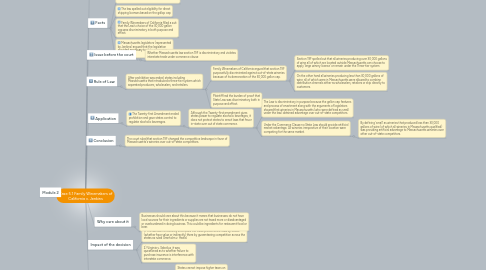
1. Module 2
2. Parties
2.1. Family Winemakers of California
2.2. Jenkins Chair of the Massachusetts Alcoholic Beverages Control Commission
3. Facts
3.1. In 2006 Massachusetts legislature enacted a new law regulating wineries irrespective of location.
3.2. The law spelled out eligibility for direct shipping licenses based on the gallop cap
3.3. Family Winemakers of California filled a suit that the Law's choice of the 30,000 gallon cap was discriminatory in both purpose and effect.
3.4. Massachusetts legislators (represented by Jenkins) argued that the legislation provided necessary tools to encourage small farmers
4. Issue before the court
4.1. Whether Massachusetts law section 19F is discriminatory and violates interstate trade under commerce clause
5. Application
5.1. The Twenty-first Amendment ended prohibition and gave states control to regulate alcoholic beverages.
5.1.1. Although the Twenty-first amendment gives states power to regulate alcoholic beverages, it does not protect states to enact laws that favor in-state over out of state commerce.
5.1.1.1. The Law is discriminatory in purpose because the gallon cap features and process of enactment along with the arguments of legislators showed that wineries in Massachusetts (who were defined as small under the law) obtained advantage over out-of-state competitors.
5.1.1.2. Under the Commerce Clause no State Law should provide artificial market advantage. All wineries irrespective of their location were competing for the same market.
5.1.1.2.1. By defining 'small' as wineries that produced less than 30,000 gallons of wine (of which all wineries in Massachusetts qualified) was providing artificial advantage to Massachusetts wineries over other out-of-state competitors.
6. Conclusion
6.1. The court ruled that section 19F changed the competitive landscape in favor of Massachusetts's wineries over out-of-state competitors.
7. Rule of Law
7.1. After prohibition was ended, states including Massachusetts that introduced a three-tier system which separated producers, wholesalers, and retailers.
7.1.1. Family Winemakers of California argued that section 19F purposefully discriminated against out-of-state wineries because of its demarcation of the 30,000 gallon cap.
7.1.1.1. Section 19F spelled out that all wineries producing over 30,000 gallons of wine all of which are located outside Massachusetts can choose to apply 'large winery license' or remain under the Three-tier system
7.1.1.2. On the other hand all wineries producing less than 30,000 gallons of wine, all of which were in Massachusetts were allowed to combine distribution channels either as wholesalers, retailers or ship directly to customers.
7.1.2. Plaintiff had the burden of proof that State Law was discriminatory both in purpose and effect.
